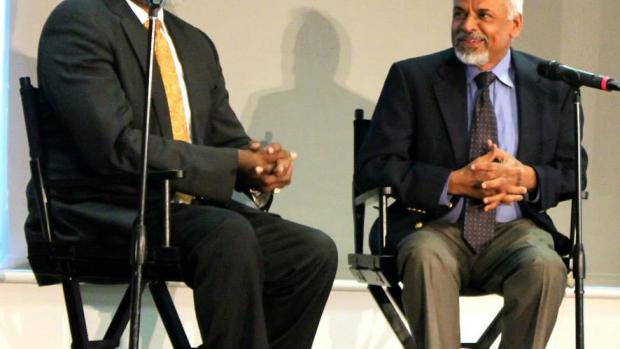In Conversation with S. James Gates

Being bombarded with questions from a group of eager students is all in a day’s work for most professors. Few, however, probably deal with students quite as eager as those attending the NYU Polytechnic School of Engineering’s recent Spotlight Series with S. James Gates, the John S. Toll Professor and Director of the Center for String and Particle Theory at the University of Maryland, a National Medal of Science winner, and a member of the President’s Council on Science and Technology.
And few could probably handle those rapid-fire queries with quite as much aplomb as Gates, who is widely known for his ability to explain science to laypeople and who is often seen on such television shows as Nova.
Asked about the challenges facing him as a scientist doing groundbreaking work, Gates, who was awarded an honorary doctoral degree from the school in 2013, laughed: “Life is full of challenges. Just getting out of bed in the morning is a challenge.” Asked if he finds science fun, he concurred: “The strange kind of fun that often feels like pain.”
The event was billed as a “candid discussion on life, academics, the role of university’s in today’s society and a little physics,” and it encompassed all that and more—including politics. “The administration doesn’t want you to know this, because they don’t want to be seen as elitist, but President Obama is shockingly smart,” Gates says, and Star Trek references he evinced a wistful desire that starships actually existed.
Along with Dean Katepalli Sreenivasan, who helped moderate the discussion, Gates touched upon the beauty of symmetry, “Look at the periodic table; it’s perfectly balanced,” he enthused, the importance of the scientific method, “the only way our species can come up with increasingly accurate answers," the difference between truth and accuracy, “If I measure myself and report what the ruler shows, I’m telling the truth, but how accurate is that measurement?" And the difficulties of coping with ambiguity, “Scientists understand that it’s rare to be completely certain about something." Agreeing with that last statement, Sreenivasan reminded the audience that string theory is a mathematical construct, not proven in the laboratory, prompting Gates to quip, “One day it may lead to something important.”
It was heady stuff, and while some of it was abstract, Gates left his audience with several words of practical advice. “Science has a set of ethics built right in,” he said. “You must be honest about your observations, and you must try to use the highest standards of logic and reason.” Admitting that in their fervent quest to understand the universe, some scientists have been known to stretch the truth, Gates admonished, “Just don’t, because if you do, you will be caught.”




